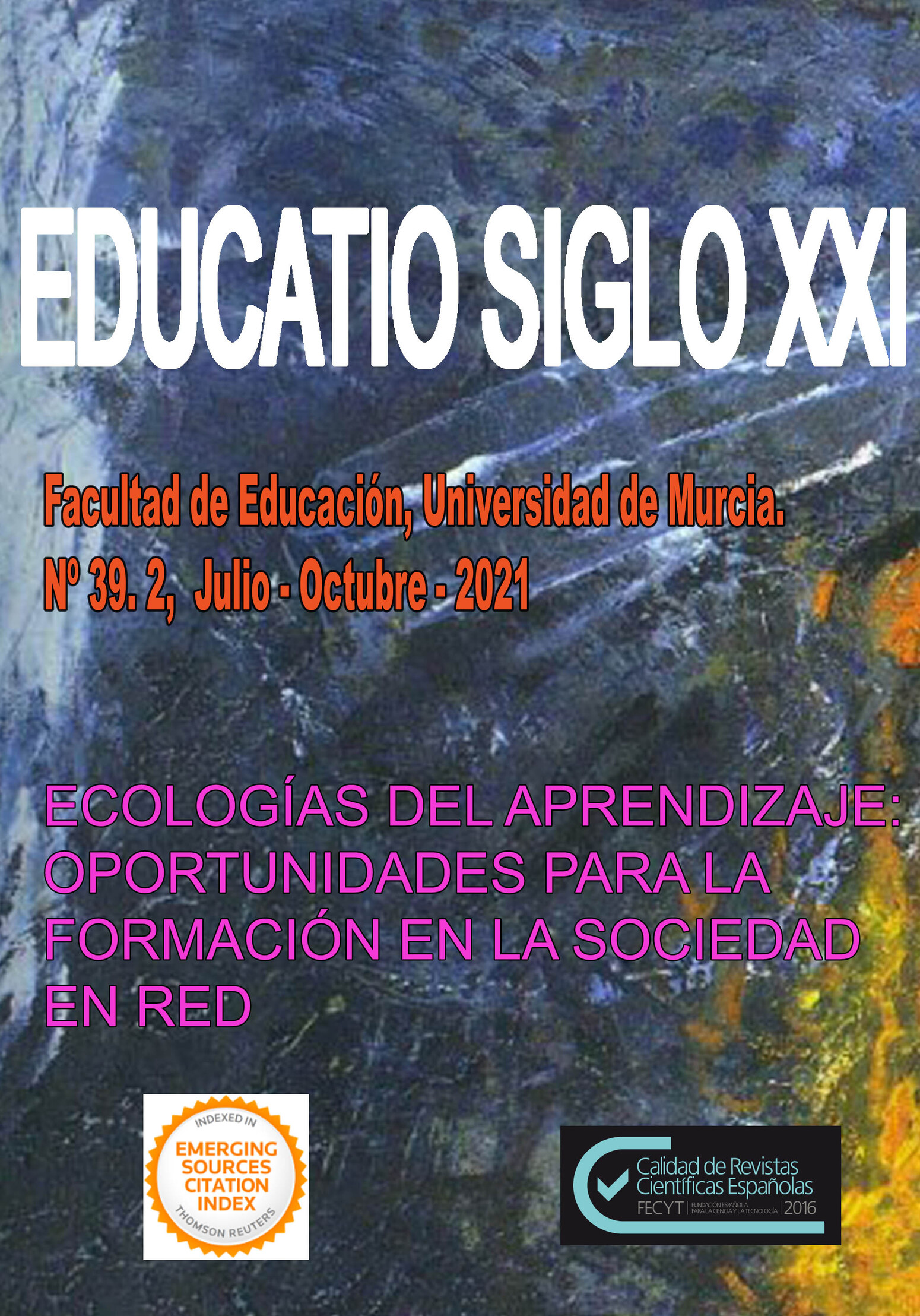Facebook and Informal learning: a new methodological approach in language teaching
Abstract
This research paper is concerned with the implementation of innovation techniques in the process of learning and teaching foreign languages. Adapting contents to twenty-first century students' mentalities implies information has to be used collectively. Our main aims are the assessment of informal learning through stimuli and alternative dynamics which connect self-assessment and co-assessment, as well as developing and carrying out competences and strategies which facilitate learning. For the experimental process we worked with Italian and Spanish language students. In order to accomplish our goal, we delivered a series of collaborative courses in which qualitative and quantitative studies related to learning through Facebook as a social network were conducted. Besides, we distributed work among communities which adopted a constructive dimension of knowledge through the shared use of information. The process facilitated both the production and the exchange of knowledge based on the pragmatic and sociocultural nature of the contents, while also taking into account the enhancement of basic competences such as know how to be and how to do. Results were very encouraging, although quite controversial during the collection process, due to the fact that students had been educated for generations in individualistic learning systems. However, learning communities strongly motivated them and, in the end, positive results were reported thanks to the implementation of informal learning.
Downloads
-
Abstract855
-
PDF (Español (España))545
References
Álvarez, A. (2014). Actitudes y valoración en el uso de una red social para el aprendizaje. Revista de Comunicación Vivat Academia, 17(128), 92-106. https://doi.org/10.15
/va.2014.128.92-106.
Baran, B. (2010). Facebook as a formal instructional environment. British Journal of Educational Technology, 41(6), 146-149. https://doi.org/10.1111/j.1467-8535.
01115.x.
Bartolotta, S., Giordano Paredes, M. A. y Moreno Celeghin, M. G. (2018). Web 2.0 y aprendizaje cooperativo: una propuesta de la Universidad Nacional de Educación a Distancia para la enseñanza de la lengua italiana. En O. Buzón García (Coord.), Nuevas pedagogías con tecnologías emergentes (pp. 67-83). Madrid: Dykinson S.L.
Cano García, M. E. (2008). La evaluación por competencias en la educación superior. Revista de Currículum y Formación de Profesorado, 12(3), 1-16. Recuperado de
https://recyt.fecyt.es/index.php/profesorado/article/view/42469/24384.
Coinu, M. (2006). Le teorie del apprendimento. Dispensa Didattica per il Corso di Progettazione Didattica per la Formazione a Distanza. Roma: Università La Sapienza di Roma.
Colombo, M. y Varani, A. (2008). Costruttivismo e riflessività. La formazione alla pratica di insegnamento. Bergamo: Edizioni Junior.
Concheiro Coello, P. (2016). Facebook como espacio de aprendizaje de ELE en el contexto irlandés y su efecto en el proceso de lectoescritura. Redele Revista Electrónica de Didáctica del Español Lengua Extranjera, (28), 1-29. Recuperado de https://sede.educacion.gob.es/publiventa/redele-n-28-revista-electronica-de-didactica-espanol-como-lengua-extranjera/ensenanza-lengua-espanola/21627.
Fewkes, A. y Mccabe, M. (2012). Facebook: Learning tool or distraction? Journal of Digital Learning in Teacher Education, 28(3), 92-98. https://doi.org/10.1080/215
2012.10784686.
Garayzábal Heinze, E. y Codesido García, A. I. (2015). Fundamentos de Psicología lingüística. Madrid: Editorial Síntesis.
Gardner, H. (1994). Intelligenze multiple. Milano: Anabasi.
Parra Castrillón, E. (2010). Las redes sociales de Internet: también dentro de los hábitos de los estudiantes universitarios. Tendencias, 11(2), 193-207. Recuperado de https://revistas.udenar.edu.co/index.php/rtend/article/view/589.
Pepe, D. (1997). La psicologia di Piaget nella cultura e nella società italiane. Milano: FrancoAngeli.
Piaget, J. (1976). Il linguaggio e il pensiero del fanciullo. Firenze: Giunti Barbera.
Priscitelli, A., Adaime, I. y Binder, I. (Comps.) (2010). El Proyecto Facebook y la pos universidad. Sistemas operativos sociales y entornos abiertos de aprendizaje. Madrid: Ariel y Fundación Telefónica.
Rivoltella, P. C. (2003). Costruttivismo e pragmática della comunicazione on line. Società e didattica i Internet. Trento: Erickson.
Sancassani, S., Brambilla, F., Marenghi, P. y Menon, S. (2011). E-Collaboration Il senso della Rete. Metodi e strumenti per la collaborazione online. Milano: Apogeo.
Santalucia, D. (2015). Competenza digitale e glottotecnologie per l’insegnante di italiano L2/LS. Italiano LinguaDue, 7(1), 157-183. https://doi.org/10.13130/2037-3597/
Trinchero, R. (2014). Valutare l’apprendimento nell’e-learning. Dalle abilità alle competenze. Trento: Erickson.
Trujillo Torres, J. M., Cáceres Reche, M. Pilar, Hinojo Lucena, F. J. y Aznar Díaz, I. (2011). Aprendizaje cooperativo en entornos virtuales. El proyecto Redes Educativas y Organizativas Interuniversitarias. Educar, 47(1), 95-119. Recuperado de https://ddd.uab.cat/pub/educar/0211819Xv47n1/0211819Xv47n1
p95.pdf.
Vázquez Cano, E., Sevillano García, M. L. (2011). Educadores en red. Elaboración y edición de materiales audiovisuales para la enseñanza. Madrid: Ediciones Académicas (UNED).
Vázquez, G. (2008). De la corrección de errores a la evaluación de las competencias: impacto de la evaluación sobre las personas y la sociedad. En XVIII Congreso Internacional de la Asociación para la Enseñanza del Español como Lengua Extranjera (ASELE). (pp. 45-55). Alicante: Centro Virtual Cervantes. En https://
cvc.cervantes.es/ensenanza/biblioteca_ele/asele/pdf/18/18_0045.pdf.
Vygotskji, L. (1980). Il processo cognitivo. Torino: Boringheri.
Wenger, E. (1998). Communities of practise. Learning meaning and identity. Cambridge: University Press.
Wong, L. H., Chai, C. S. y Aw, G. P. (2017). Seamless Language Learning: Second Language Learning with Social Media. Comunicar, 25(50), 9-20. https://doi.org/1
3916/C50-2017-01.
Zhang, D, Zhao, J. L., Zhou, L. y Nunamaker, J. F. (2004). Can e-learning replace classroom learning? Communications of the ACM, 47(5), 75-79. https://doi.org/1
1145/986213.986216.

This work is licensed under a Creative Commons Attribution-NonCommercial-NoDerivatives 4.0 International License.
Original work publishes in this journal is subject to the following terms:
1. Murcia University Press (the publishing house) holds the copyright of the publishes work, and favours and allows their reutilization under the use license stated in point 2.
© Servicio de Publicaciones, Universidad de Murcia, 2015
2. Work is published in the electronic edition under a license (Creative Commons Reconocimiento-NoComercial-SinObraDerivada 4.0 España (legal text). They can be copied, used, disseminated, transmitted and publicly presented, as long as: i) authorship and original publication source is acknowledged (journal, publishing house and URL of the work); ii) are not used for commercial purposes; iii) the existence and specifications of this use license is stated.
3. Conditions for self-archive. Authors are allowed and encouraged to disseminate electronically the pre-pint (before review) and/or post-print (accepted for publication) versions of their work before their publication since that favours earlier circulation and dissemination resulting in an increased chance for the authors to be cited and for the work to reach a bigger share of the academic community. Colour: RoMEO: green.








